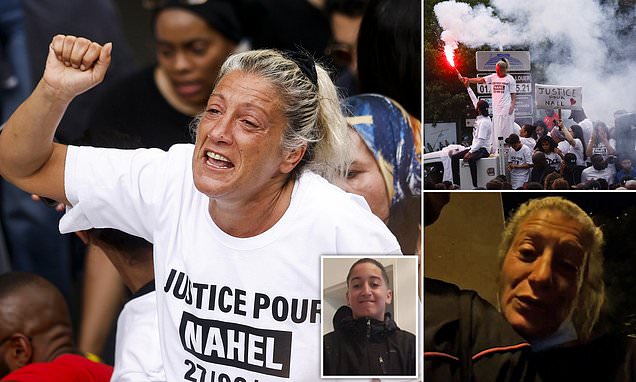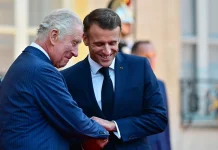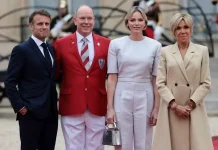On Tuesday morning, 17-year-old French Algerian boy Nahel M. kissed his mother Mounia goodbye as the pair left their home for work in the Parisian suburb of Nanterre.
It would be the last time they ever saw each other.
Hours later, Mounia discovered her only son had been shot dead at point-blank range by a policeman during a traffic stop in what has been described as an ‘execution’ – the latest and perhaps most egregious example of police violence in France.

Now, Mounia is leading protests against the authorities amid widespread outcry at Nahel’s death, which has prompted renewed speculation that France’s police force is rife with racial discrimination.
Yesterday she guided a 6000-strong group of demonstrators on a march through the streets of Nanterre, holding flares and chanting ‘Justice for Nahel’.
It came after she shared a tearful video on social media, lashing out at the officer who shot her son dead.
‘He gave me a big kiss and told me he loved me, I told him to be careful, we left the house at the same time and went to McDonalds, then I went to work like everyone.

‘He was everything to me, and that son of a b***h shot him,’ Mounia said. ‘I only had one, he was my best friend, my son, we were so close.’
France is now facing a third full day of bitter clashes between the country’s youth and riot police, after the past three nights saw hordes of protesters setting cars alight, attacking municipal buildings and chanting for justice.
Mounia later told France 5 that she holds the shooter responsible, not the police force.’I don’t blame the police, I blame a person: the one who took my son’s life.
‘I have police friends, they are wholeheartedly with me. They do not agree with what he did,’ she said.

‘He didn’t have to kill my son, there were other ways of doing it. A bullet? So close to his chest? No… there are other ways of doing it. get them out (of the vehicle, editor’s note). Killing little ones like that… How long will it last? How many more children will die?’
The offending officer, who has not been identified, was taken into custody pending further investigation.
Mounia’s march, in which she led a stream of 6,000 protesters wearing white t-shirts with ‘Justice for Nahel’ emblazoned across them, was initially peaceful.
But as the march progressed, youths began to light fires and threw projectiles at the hundreds of riot police in the area.
Within minutes, large clouds of thick black smoke were seen trailing into the air, mixing with tear gas fired by the officers.
The demonstration came as President Emmanuel Macron convened a crisis meeting with police chiefs and senior minister, at which it was agreed to put an extra 40000 police on the streets.
Macron described the killing of Nahel as ‘inexcusable’, but he and his government ministers have condemned the protest as ‘damaging to the Republic’.
French Prime Minister Elisabeth Borne today said that the government was considering ‘all options’ to restore order after widespread unrest and violence, including the declaration of a state of emergency.

This would give local authorities increased powers to declare localised curfews, ban demonstrations, and give police more freedom in restraining suspected rioters and searching homes.
Nahel, who worked as a delivery driver was gunned down at the wheel of his car.
A shocking video shows the moment a police officer stood at his window with his pistol drawn and aimed at the boy inside, before firing a shot.
In light of his death, the United Nations declared that France must address deep issues of racial discrimination in its police after a third night of unrest rocked France’s streets.
‘We are concerned by the killing of a 17-year-old of North African descent by police in France on Tuesday,’ UN human rights office spokeswoman Ravina Shamdasani told a media briefing in Geneva.
‘We note that an investigation has been launched into alleged voluntary homicide.
‘This is a moment for the country to seriously address the deep issues of racism and discrimination in law enforcement.’












